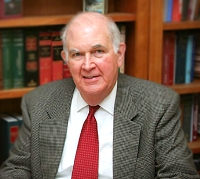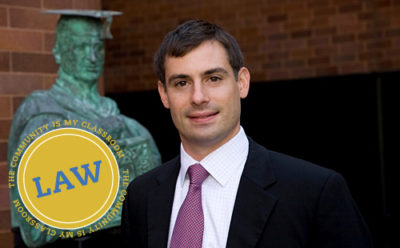UMKC Law students rewarded by helping others
As a public defender, Tyler Wood found daily opportunities to mend wounds, help families or encourage someone to put his or her best foot forward.
“Every night, when I got home from work, I asked myself if I affected someone’s life in a positive manner,” said Wood, a spring 2011 School of Law graduate and volunteer with the Missouri State Public Defender System. “When I could answer ‘yes,’ the feelings I got made me eager to get back to the office the next morning.”
Responding to community needs
Along with this encouragement and sense of excitement, Wood recalled a few long, sleepless nights spent in a maze of legal writings.

Bill Eckhardt, clinical professor of Law and director of Urban Affairs Outreach, has helped double the School of Law’s externship programs.
“Sometimes, sitting in my comfortable home, I would grow tired of researching the law; but I always got a second wind by reminding myself that my client was trying to sleep in the county jail,” Wood said. “When I thought about that person who was depending on me, somehow my work didn’t seem so difficult.”
As Bill Eckhardt, clinical professor of Law and director of Urban Affairs Outreach, reflects on UMKC School of Law students’ involvement with public clients, he sees a university that has been responsive to the hardships around it.
“As community needs changed, the School of Law changed with it,” Eckhardt said. “We doubled our externships, because the students are mature enough to handle them. Students need to know the legal process first-hand, and there is no other way to find out.”
Likewise, students praised the School of Law’s development of pro bono and public service programs in which law student volunteers could help everyone receive the same quality legal representation as clients of means.
Real-world experience
Eckhardt calls himself the “default leader of the public defender trial clinic.” He can cite from memory the number of hours UMKC law students spend in state and federal offices.
“EPA regional office, where they help farmers comply with laws, 1,000 hours,” said Eckhardt. US Attorney’s Office, Western District, 6,000 hours. The Missouri Attorney General’s office, 1,360 hours. Social Security, 960 hours. We also have students working with federal public defenders and OSHA, but I don’t have those figures in mind.”
Kansas City is one of 10 federal governing cities, and the need for quality assistance is great. The agencies have an immense pool of talent; and their lawyers act as adjunct professors, giving students pertinent research and writing skills.
“Real-life work is sometimes terrifying, but it makes school more relevant; and before long, these students will be called on to defend someone — that day is coming for sure,” said Eckhardt. “Students realize that they may be the only thing standing between a client and jail or fines.”
UMKC law faculty members are respectful of the agencies’ time and integrity, and work hard to establish long-term relationships. This creates a bridge for students. They get a rich academic experience, going into an office like an associate, working 80 hours a semester or about one day a week. Students want experience, especially in criminal law. By taking externships, they pay their public dues and get practice being trial lawyers. They are totally submerged in their work and under the tutelage of someone in whom UMKC has confidence.
A “counselor in life”
“Clients of the Missouri State Public Defender System are determined by income level and level of punishment they may receive,” said Wood. “Some of them have an almost inherent distrust of the government and particularly the justice system. They require more that competent legal representation — they need encouragement and sound advice. This holistic approach sets the public defenders apart from other lawyers – I am a ‘counselor at law’ and I am at times — and I believe just as importantly -– a ‘counselor in life.'”
Students’ experiences allow them to make calculated decisions about what to do after law school.
“When they become young professionals, they do not want to fail,” said Eckhardt. “These externships provide meaningful work, but students are working with a safety net. Supervisors need to be blunt, so students must develop relationships that make honest appraisal of their work welcome. Their work must be analyzed and helpful feedback given.”
With the practice of researching, writing and delivering the formal dialogue that is part of courtroom procedure, students’ self-confidence grows. Student volunteers got a pat on the back when members of the US Attorney’s Office filed briefs acknowledging their good work.
Professor Eckhardt has never been told “no” when looking to place UMKC students. Although it is a lot of work for the supervising attorney — probably easier to do the work themselves — still they agree to work with the students.
With this exceptional background, when UMKC students who have taken externships leave the School of Law, they have an accelerated start.
In trying to land the positions in Missouri state and federal offices, UMKC has a competitive edge, because of its strength in teaching legal research and writing skills.
Eckhardt is stunned by the students’ performance and work ethic and proud of the students, the UMKC School of Law and the work he’s been privileged to do.

